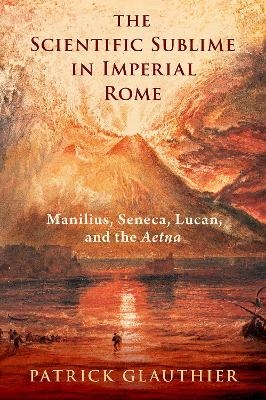
The Scientific Sublime in Imperial Rome
Manilius, Seneca, Lucan, and the Aetna
Seiten
2025
Oxford University Press Inc (Verlag)
978-0-19-778755-7 (ISBN)
Oxford University Press Inc (Verlag)
978-0-19-778755-7 (ISBN)
- Noch nicht erschienen (ca. März 2025)
- Versandkostenfrei innerhalb Deutschlands
- Auch auf Rechnung
- Verfügbarkeit in der Filiale vor Ort prüfen
- Artikel merken
The Scientific Sublime in Imperial Rome charts the role of the sublime in first-century debates about how and why we investigate the natural world. It shows how the sublimity of the study of nature--the scientific sublime--animates Manilius' Astronomica, Seneca's Natural Questions, Lucan's Civil War, and the anonymous Aetna, and explores how these authors inflect and deploy the scientific sublime in their respective historical and socio-political contexts.
Imbued with the triumphal optimism of the Augustan moment, Manilius takes the reader on a rollercoaster ride through the expanses of the heavens, reveling in the infinite dimensions of the cosmos and the astounding ability of his mathematical calculations to uncover the mind of god; this is the ultimate intellectual pursuit. The instability and paranoia of the Neronian period fundamentally compromise this posture. In Natural Questions, Seneca rejects Manilius' celestial adventure and redirects the reader's gaze to atmospheric phenomena. The turbulence and tumult of meteorological inquiry do not lead to certain knowledge, but Seneca hopes that its electric vitality might counteract the allure of morally corrupt pastimes and of political power itself. For Lucan, the Manilian and Senecan projects are delusional fantasies. The study of nature, stripped of the illusion that it serves some higher purpose, constitutes a distraction from the urgent necessity of civil war, and those characters who understand nature's mechanics appear laughably irrelevant or downright deadly. In the early Flavian period, the Aetna poet rehabilitates the ecstatic charge of natural inquiry. Dismissing the lofty aspirations of Manilius and Seneca, the author careens over Sicily's jagged terrain and plunges the reader into the depths of the earth searching for terrestrial knowledge. By the poem's conclusion, however, sheer awe before the amphitheatrical spectacle of nature supplants the rush of philosophical analysis as the goal of studying the earth; this attitude connects the poet with Longinus and the Elder Pliny.
Through close readings, this book tells a new story about the study of nature at Rome. It locates the sublimity of that study at the center of early imperial Latin literature and thereby renders the classical sublime more expansive, dynamic, and contested.
Imbued with the triumphal optimism of the Augustan moment, Manilius takes the reader on a rollercoaster ride through the expanses of the heavens, reveling in the infinite dimensions of the cosmos and the astounding ability of his mathematical calculations to uncover the mind of god; this is the ultimate intellectual pursuit. The instability and paranoia of the Neronian period fundamentally compromise this posture. In Natural Questions, Seneca rejects Manilius' celestial adventure and redirects the reader's gaze to atmospheric phenomena. The turbulence and tumult of meteorological inquiry do not lead to certain knowledge, but Seneca hopes that its electric vitality might counteract the allure of morally corrupt pastimes and of political power itself. For Lucan, the Manilian and Senecan projects are delusional fantasies. The study of nature, stripped of the illusion that it serves some higher purpose, constitutes a distraction from the urgent necessity of civil war, and those characters who understand nature's mechanics appear laughably irrelevant or downright deadly. In the early Flavian period, the Aetna poet rehabilitates the ecstatic charge of natural inquiry. Dismissing the lofty aspirations of Manilius and Seneca, the author careens over Sicily's jagged terrain and plunges the reader into the depths of the earth searching for terrestrial knowledge. By the poem's conclusion, however, sheer awe before the amphitheatrical spectacle of nature supplants the rush of philosophical analysis as the goal of studying the earth; this attitude connects the poet with Longinus and the Elder Pliny.
Through close readings, this book tells a new story about the study of nature at Rome. It locates the sublimity of that study at the center of early imperial Latin literature and thereby renders the classical sublime more expansive, dynamic, and contested.
Patrick Glauthier is Assistant Professor of Classics at Dartmouth College.
| Erscheint lt. Verlag | 20.3.2025 |
|---|---|
| Verlagsort | New York |
| Sprache | englisch |
| Maße | 156 x 235 mm |
| Themenwelt | Literatur ► Klassiker / Moderne Klassiker |
| Geschichte ► Allgemeine Geschichte ► Vor- und Frühgeschichte | |
| Geisteswissenschaften ► Philosophie ► Philosophie Altertum / Antike | |
| ISBN-10 | 0-19-778755-X / 019778755X |
| ISBN-13 | 978-0-19-778755-7 / 9780197787557 |
| Zustand | Neuware |
| Informationen gemäß Produktsicherheitsverordnung (GPSR) | |
| Haben Sie eine Frage zum Produkt? |
Mehr entdecken
aus dem Bereich
aus dem Bereich
Was Pompeji über uns erzählt
Buch | Hardcover (2023)
Propyläen (Verlag)
32,00 €
auf den Spuren der frühen Zivilisationen
Buch | Hardcover (2023)
C.H.Beck (Verlag)
20,00 €


